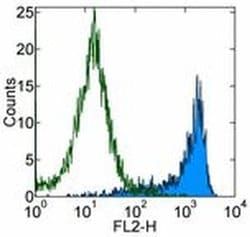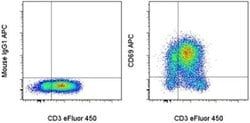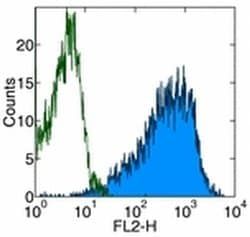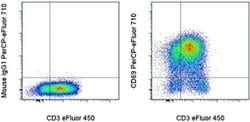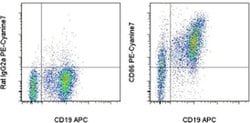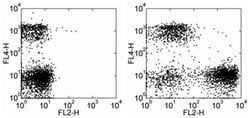CD69 Monoclonal Antibody (H1.2F3), Biotin, eBioscience™, Invitrogen™
Manufacturer: Fischer Scientific
Select a Size
| Pack Size | SKU | Availability | Price |
|---|---|---|---|
| Each | 50-116-15-Each | In Stock | ₹ 26,223.85 |
50-116-15 - Each
In Stock
Quantity
1
Base Price: ₹ 26,223.85
GST (18%): ₹ 4,720.293
Total Price: ₹ 30,944.143
Antigen
CD69
Classification
Monoclonal
Concentration
0.5 mg/mL
Formulation
PBS with 0.09% sodium azide; pH 7.2
Gene Accession No.
P37217
Gene Symbols
CD69
Purification Method
Affinity chromatography
Regulatory Status
RUO
Gene ID (Entrez)
12515
Content And Storage
4° C, store in dark, DO NOT FREEZE!
Form
Liquid
Applications
Flow Cytometry
Clone
H1.2F3
Conjugate
Biotin
Gene
CD69
Gene Alias
5830438K24Rik; Activation inducer molecule; activation inducer molecule (AIM/CD69); AI452015; AIM; BL-AC/P26; CD69; CD69 antigen; CD69 antigen (p60, early T-cell activation antigen); CD69 molecule; CLEC2C; C-type lectin domain family 2 member C; C-type lectin domain family 2, member C; EA1; early activation antigen CD69; early lymphocyte activation antigen; early T-cell activation antigen p60; GP32/28; leukocyte surface antigen Leu-23; MLR-3; VEA; Very Early Activation Antigen
Host Species
Armenian Hamster
Quantity
500 μg
Primary or Secondary
Primary
Target Species
Mouse
Product Type
Antibody
Isotype
IgG
Description
- Description: The H1.2F3 monoclonal antibody reacts with mouse CD69, also known as very early activation antigen (VEA)
- CD69 is approximately 35 kDa and is expressed on the surface as a disulfide-linked dimer
- While a small subset of lymphocytes in the thymus, spleen and lymph nodes express this antigen, activation of both T and B cells rapidly upregulates the surface expression of CD69, suggesting a role for CD69 in lymphocyte development and activation
- Applications Reported: The H1.2F3 antibody has been reported for use in flow cytometric analysis
- Applications Tested: The H1.2F3 antibody has been tested by flow cytometric analysis of resting and activated mouse splenocytes
- This can be used at less than or equal to 0.5 μg per test
- A test is defined as the amount (μg) of antibody that will stain a cell sample in a final volume of 100 μL
- Cell number should be determined empirically but can range from 10^5 to 10^8 cells/test
- It is recommended that the antibody be carefully titrated for optimal performance in the assay of interest
- Filtration: 0.2 μm post-manufacturing filtered
- CD69 (AIM, Active Inducer Molecule) is a gp28/34 disulfide bonded homodimer with a molecular weight of 60 kDa under non-reducing conditions
- CD69 contains one or two N linked oligosacaride and the molecule is present on activated platelets
- In normal peripheral blood a variable percentage of cells express the CD69 antigen, and it is involved in lymphocyte signal transduction
- Expression CD69 is induced upon activation of T lymphocytes, and may play a role in proliferation
- Furthermore, the protein may act to transmit signals in natural killer cells and platelets
- Alternative splicing results in multiple transcript variants of CD69
- Diseases associated with CD69 dysfunction include coccidiodomycosis and asthma.
